Originally Posted At: https://breakingmuscle.com/feed/rss
Got a cable machine? Then you’ve got access to one of the most fundamental exercises to directly target and isolate the triceps. The triceps pushdown, sometimes called a pressdown, is perfectly suited to beginners and experienced lifters alike.
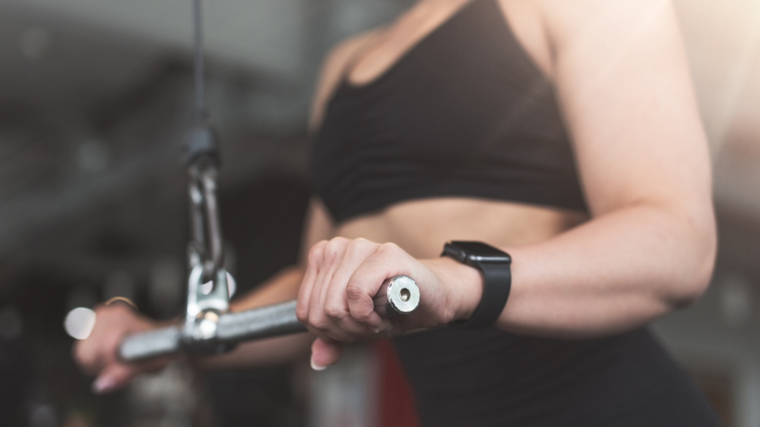
The cable’s pulley system puts tension — and lots of it — right where it belongs. All you need to do is straighten your arms and build some muscle. Okay, there’s a little more to it than that. Here are all the details.
- How to Do the Triceps Cable Pushdown
- Triceps Cable Pushdown Mistakes to Avoid
- Benefits of the Triceps Cable Pushdown
- Muscles Worked by the Triceps Cable Pushdown
- Who Should Do the Triceps Cable Pushdown
- How to Program the Triceps Cable Pushdown
- Triceps Cable Pushdown Variations
- Triceps Cable Pushdown Alternatives
- Frequently Asked Questions
How to Do the Triceps Cable Pushdown
The cable pushdown is pretty straightforward. To put maximum tension on the triceps and minimize involvement of other muscles, your elbows should remain pinned to your sides as you extend your arms down. Here’s a more in-depth look at how to get set up and how to get the most out of the exercise.
Step 1 — Set Up At the Pulley Station

Attach a straight bar to a high-cable pulley. Grab the bar with both hands in a palm-down grip. Take a small step back into a staggered stance. This will give you more total-body stability, especially when using heavier weights.
Bend your knees slightly and tighten your core. Pull your elbows toward your ribs to raise the weight from the stack. Your hands should be roughly in line with your chest, ready to perform the first rep.
Form Tip: The farther you move from the weight stack, the more your back and shoulders muscles will be engaged to keep your elbows pinned to your ribs. The cable running from the handle to the pulley should be at a slight angle.
Step 2 — Straighten Your Arms
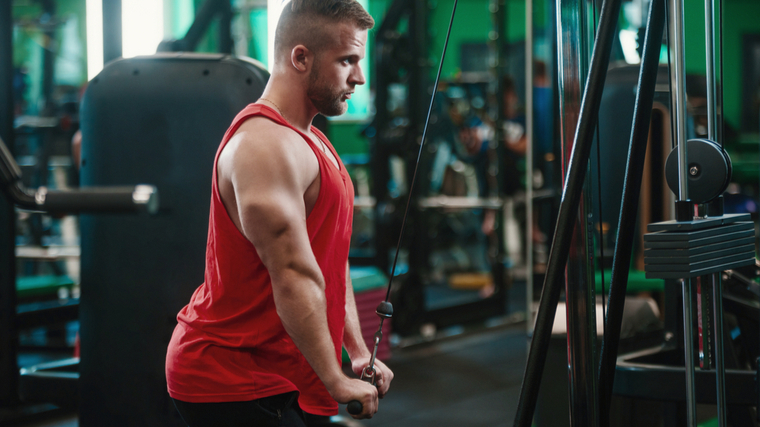
Squeeze your upper arms into your sides and pretend you are gluing them in place. Push straight down with both hands until your arms are straight but not fully locked. This maintains slight tension on the muscle and increases the muscle-building stimulus. Keep your hands in line with your forearm without bending your wrists.
Form Tip: Keep a strong, tall posture and an engaged core. You should only be moving at the elbows, not at the waist, as you drive the weights down.
Step 3 — Bend Your Arms to Lower the Weight
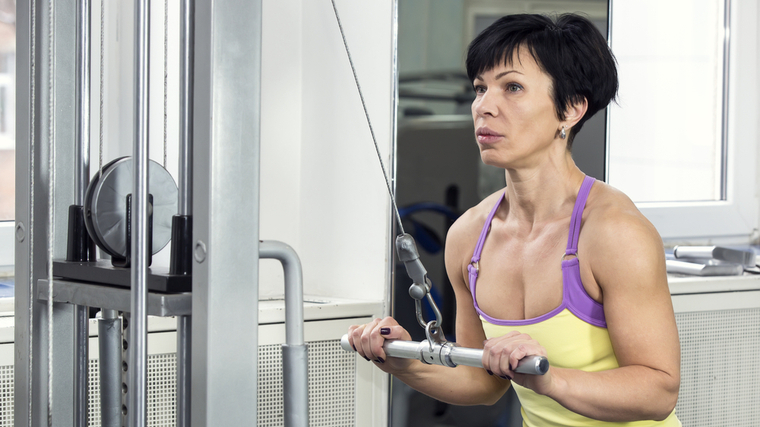
From the nearly locked out position, bend your arms and slowly return your hands upwards. Keep your elbows stuck to your ribs. When your hands are in the top position, the weights should be hovering barely above the rest of the stack. If the weights rest completely on the stack, adjust your stance and take a very small step backwards.
Form Tip: Don’t allow the weights to pull your elbows forward. Tense your abs, grip the handle hard to engage your grip and control the bar, and pull your shoulder blades back to keep a stable body position.
Triceps Cable Pushdown Mistakes to Avoid
The cable pushdown requires tightness and stability through your entire body. This can be a benefit because keeping your back, shoulders, arms, abs, and legs fully engaged builds muscular coordination.
However, this total-body recruitment also creates multiple opportunities for technique problems to occur. Here are the most significant issues to watch for.
Misaligned Posture
Hunching forward or arching your back when lifting or lowering the weight will prevent you from fully stabilizing your core. You can’t tense your abs effectively without a neutral spine.
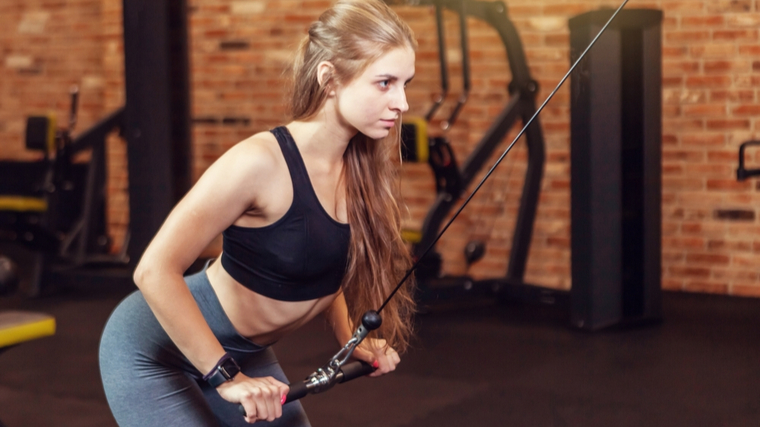
Having an unstable or angled upper body reduces your ability to control the movement. When your arms and torso aren’t vertical, you’re working through a different angle of resistance and recruiting different muscles. More importantly, a lack of core stability means you could hurt your back.
Avoid It: Stabilize your posture and alignment before each rep. Pull your core muscles up and in. Staggering your feet can also reinforce a strong upper body position because it increases lower body stability, which is transferred through the upper body.
Moving at the Shoulder
The primary movement should be from your elbows, not from your shoulders. When your shoulders work to move the weight, stress is taken off your triceps and shifted onto your deltoids (shoulders) and upper back.
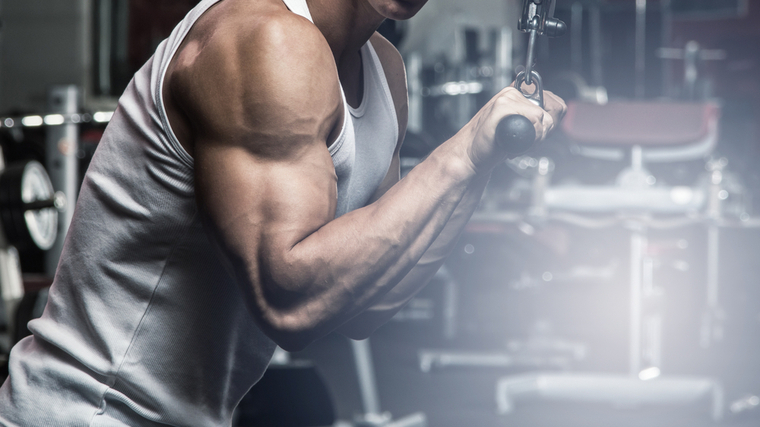
Don’t allow shoulder rotation to flare your elbows. If your elbows point sideways to the walls instead of behind you, you’ve shifted out of position.
Avoid It: Check your elbow creases. If they turn in, tightness in your shoulders or chest may be pulling your arms forward. Start practicing shoulder and chest flexibility exercises to loosen up the area. Keep the shoulder and upper arms locked into place. Keep your elbows pinned to your sides and be aware of if/when your elbows start to come forward.
Bending Your Wrists
Don’t let your wrists crane back or bend forward. Doing so increases strain on the smaller wrist joint and increases the risk of injury. Keep your hands in line with your forearms, with a straight line from your elbow to your knuckles.
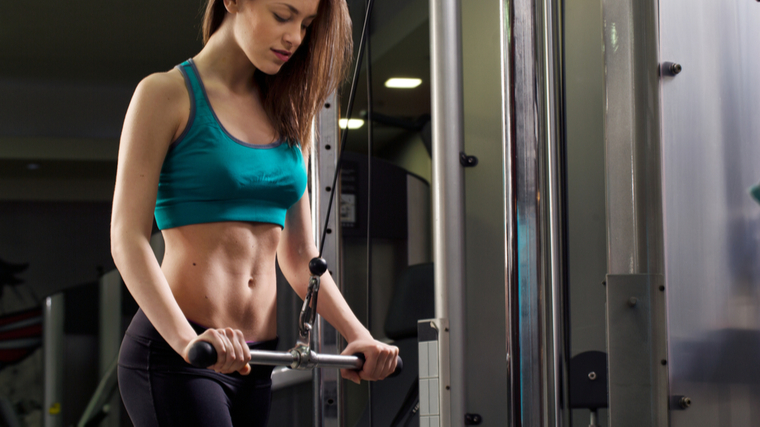
Avoid It: If breaking at the wrist is an issue for you, consider a glove with wrist wraps or wrist wraps. This external support reminds you to keep the joints in line. Gripping the bar hard, instead of passively pressing through your hands, can also reinforce a stable hand position.
Benefits of the Triceps Cable Pushdown
The cable pushdown places the triceps muscle under constant tension for the duration of the set. This long duration of muscular stress is a key factor responsible for muscle growth. (1)
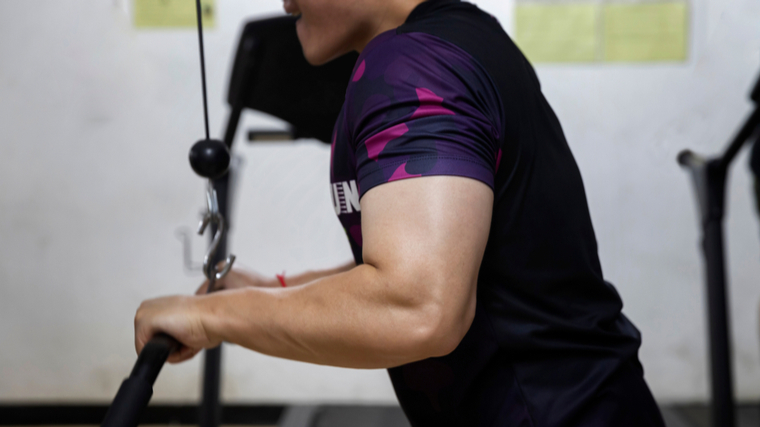
Pushdowns are a foundational triceps exercise, allowing lifters to focus solely on their triceps, which can improve the mind-muscle connection for greater activation and growth. (2)
Upper Body Strength
The triceps play a role in the majority of upper body exercises, either assisting in chest and shoulder pressing movements or as stabilizers during pulling movements. Increasing triceps-specific strength with cable pushdowns can carry over to improved strength in larger upper body exercises.
Aesthetic Muscle-Building
Cable pushdowns works all three heads of the triceps muscle, creating well-balanced muscle growth. The triceps are worked through a full range of motion with constant tension, making the pushdown an efficient way to directly target the tris.
Muscles Worked by Triceps Cable Pushdown
The triceps cable pushdown is primarily for the triceps, though several muscle groups stabilize the upper body and allow correct performance.
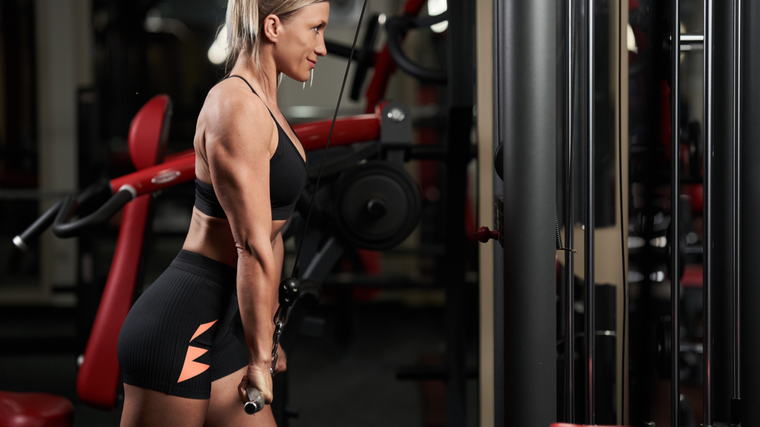
If other muscles get fatigued before the triceps during a set of pushdowns, it’s an indicator that your technique is off. Reduce the weight and be more focused on applying proper form.
Triceps Brachii
The triceps is a three-headed muscle responsible for elbow extension, or straightening the arm. It’s made up of the lateral and medial heads, which attach at the upper arm and below the elbow, and the long head which attaches to the shoulder blade and below the elbow. (3) Because the long head runs along the shoulder joint and attaches to the shoulder blade, it is also activated during shoulder movements when the upper arm is raised.
Pectoralis Major
The pectoralis major, or pecs, are the main chest muscle. The pecs are responsible for pulling your arms toward the centerline of your body. While the chest isn’t a primary mover during pushdowns, it is worked statically to provide upper body stability and to keep your elbows by your sides, particularly in the locked out position.
Upper Back
The upper back muscles include the trapezius, rhomboids, teres, and rear deltoids. This collection of muscles work in similar roles to control the shoulder blades, shoulder position, and posture. During cable pushdowns, the upper back is highly activated to stabilize your upper body and maintain a stable upper arm position as the lower arm moves the weight.
Who Should Do the Triceps Cable Pushdown
The pushdown can be used by any lifter looking to emphasize their triceps. The movement can be implemented into strength-building programs, as well as any arm day or muscle-specific routine designed to build size.
Beginners
When you’re first learning how to train various muscles of the body, the triceps cable pushdown is a useful movement to start with because it isolates the muscle group. This targeted work allows new lifters to feel the muscle working throughout the entire range of motion.
Training for Muscle Growth
Whether you’re a physique competitor or training for general aesthetics, this exercise can help to build to triceps. Increased triceps activation without interference from other muscles stimulates greater muscle growth in the target muscle leading, simply, to bigger arms.
How to Program the Triceps Cable Pushdown
The triceps cable pushdown is easy to implement into most routines as long as you have access to a cable machine. The exercise isn’t well-suited to extremely heavy weights and low-rep sets, because strict form becomes unmanageable and additional muscles are recruited. However, light or moderate weights can be highly effective for muscle growth due to the high tension provided by the cables.
Moderate Weight, Moderate Reps
Training the cable pushdown with three to four sets of eight to 12 reps is a classic muscle-building approach. This is a time-tested way to pack on triceps size and build larger arms.
Light Weight, High Reps
Using the pushdown as a finisher or burnout is a very high-intensity way to end any arm workout. One or two sets of 15 to 25 reps, reaching muscular failure at the last rep, is an excellent method for increasing training volume. The lighter weights make this approach is particularly useful for lifters who need to minimize joint strain.
Paired with Biceps Training
Because the cable pushdown requires minimal setup, one extremely effective way to program the exercise is to superset it with any biceps exercise. By alternating between a biceps curl and triceps pushdown, you can quickly and efficiently train your entire arm with high intensity.
Triceps Cable Pushdown Variations
The triceps pushdown is extremely versatile. With a simple adjustment of the handle attachment, you can change things up, add an extra challenge, and work the triceps in slightly different ways.
Rope Pushdown
Using a rope attachment puts your hands in a neutral (thumbs-up) grip, which can be beneficial for lifters dealing with wrist or elbow pain because it places the muscles around those joints in a stronger position, which relieves stress on the joints.
While this variation doesn’t necessarily recruit the triceps muscle differently, it offers a slightly longer range of motion. The hands begin close together in the top position and flare out to the sides in the bottom position. Your elbows should remain stuck to your ribs, only your hands should move.
Reverse-Grip Pushdown
The reverse-grip pushdown isn’t often seen in gyms, but it can be an effective variation to reinforce strict form. With a supinated (palm-up) grip, swinging your torso is less effective since the bar is only held in place with your fingers, compared to a more secure a palm-down grip which covers the bar with your entire hand.
This underhand grip also reinforces proper elbow position because it becomes more difficult to flare your elbows out with this setup.
Single-Arm Pushdown
Performing a single-arm pushdown emphasizes each individual arm during a set. This one-sided attention helps to fight strength and muscular discrepancies that may develop from over-focusing on bilateral (simultaneous two-arm) exercises.
Single-arm pushdowns can be performed with a single-handle, a rope attachment, or no handle at all holding just the attachment anchor.
Triceps Cable Pushdown Alternatives
If you don’t have access to a cable pulley, there are still plenty of effective options to work your triceps. It’s always fun to mix it up, and it’s important to challenge the muscles in different ways.
Diamond Push-Up
The diamond push-up, or close-grip push-up, is a reliable bodyweight exercise to emphasize the triceps. The narrow hand position recruits more triceps and relatively less chest muscles to complete the movement.
This is another extremely efficient exercise to alternate with biceps training to create a quick arm-building workout. Perform any set of curls, drop and perform diamond push-ups, rest briefly, and repeat.
Triceps Kickback
This dumbbell movement is often performed with very light weights for very high reps. However, maintaining good form while moving more challenging weights in the 10-12 rep range can be a serious muscle-building exercise.
The key is to keep your elbows stuck to your ribs and not recruit the back or shoulder muscles to move the weights. You can increase the time under tension and muscle-building stimulus for the triceps by pausing in the top position for a full one or two seconds.
Dumbbell Skull Crusher
This exercise works the triceps in a slightly different plane of motion, with the arms perpendicular to the body instead of alongside the torso. This can slightly change the muscle recruitment of different triceps heads and lead to a new muscle-building stimulus. (4)
Using dumbbells also allows more freedom for the wrist and elbows to move, which can reduce strain on the joints. Keep the dumbbells in line with your shoulders. In the bottom position, the weights should be near your ears.
FAQs
Do I need to work my triceps specifically?
While the triceps are worked actively during most chest and shoulder exercises, as well as serving a supportive role during most back exercises, direct triceps training is essential for maximum muscle growth.
The triceps also play a functional role in many daily activities, from closing a car door to getting up off the ground after falling. Building the triceps specifically, within a comprehensive training program, can play a critical role in improving overall functional strength.
What if my arms can’t stay by my sides?
A physical inability to keep your arms at your sides against resistance may be caused by chest or shoulder immobility. When the chest or shoulders are excessively tight, they want to pull the arms forward and inward.
Performing a simple doorway chest stretch daily is one efficient place to start. In addition, work on overall posture and alignment to encourage overall strength and stability.
Get Down with Pushdowns
The triceps cable pushdown is such a basic and effective movement in the gym, it is easy to pepper into your workout routine. Using strict form and a full range of motion will add size to your triceps, help to keep your elbows and shoulders healthy, and support all of your big pressing goals.
References
- Burd NA, Andrews RJ, West DW, et al. Muscle time under tension during resistance exercise stimulates differential muscle protein sub-fractional synthetic responses in men. J Physiol. 2012;590(2):351-362. doi:10.1113/jphysiol.2011.221200
-
Calatayud J, Vinstrup J, Jakobsen MD, Sundstrup E, Brandt M, Jay K, Colado JC, Andersen LL. Importance of mind-muscle connection during progressive resistance training. Eur J Appl Physiol. 2016 Mar;116(3):527-33. doi: 10.1007/s00421-015-3305-7. Epub 2015 Dec 23. PMID: 26700744.
-
Kholinne, E., Zulkarnain, R. F., Sun, Y. C., Lim, S., Chun, J. M., & Jeon, I. H. (2018). The different role of each head of the triceps brachii muscle in elbow extension. Acta orthopaedica et traumatologica turcica, 52(3), 201–205. https://doi.org/10.1016/j.aott.2018.02.005
Featured Image: Slatan / Shutterstock
The post How to Do the Triceps Pushdown for Bigger Arms appeared first on Breaking Muscle.
Filed under: Fitness

 For now classes are 6pm and 640pm at 2840 Wildwood st in the Boise Cloggers studio.
Book your class NOW!
click this ==>
For now classes are 6pm and 640pm at 2840 Wildwood st in the Boise Cloggers studio.
Book your class NOW!
click this ==>








